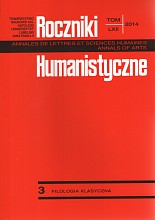Typy łacińskich przysłówków oceniających
Types of Latin Evaluative Adverbs
Author(s): Małgorzata GórskaSubject(s): Language and Literature Studies
Published by: Towarzystwo Naukowe KUL & Katolicki Uniwersytet Lubelski Jana Pawła II
Keywords: sentential adverbs; evaluative adverbs; axiology; valuation; epistemic modality; evidentiality; mirativity
Summary/Abstract: The article suggests ordering the division of the sub-group of sentential adverbs, defined as evaluative adverbs, that is not consistent enough. The suggestion consists first of all in separating evaluative adverbs in the strict sense, that is ones referring to axiological categories, from other types of evaluative adverbs. Among the latter the following ones may be distinguished: 1. Epistemic adverbs, with the help of which the speaker evaluates the truth of the proposition (certe, certo, plane, profecto, sane, vero, vere, fortasse, forsitan), 2. evidential adverbs that point the basis on which the speaker gives some information (scilicet, videlicet), and 3. mirative adverbs, with which the speaker expresses his surprise that the given state of affairs does occur (inopinanter, inopinate, inopinato, necopinato). Among 4.the evaluative adverbs in the strict sense, in turn, four sub-groups may be distinguished: a. generally evaluating (bene, male), b. referring to cognitive values (sapientier, stulte, imprudenter, inepte, recte, falso), c. referring to utilitarian values (opportune, feliciter, (per)commode incommode, perincommode), and d. referring to moral values (recte, falso, merito, iure, iniuria). In the suggestion, recognizing the adverbs expressing surprise as the marker of mirativity is the most arguable point, as it is a language category that has been noticed relatively recently and has not been yet well recognized.
Journal: Roczniki Humanistyczne
- Issue Year: 62/2014
- Issue No: 03
- Page Range: 97-109
- Page Count: 13
- Language: Polish

